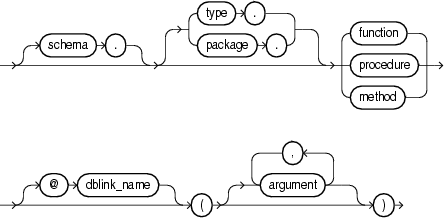| Oracle® Database SQL Language Reference 11g Release 2 (11.2) Part Number E26088-02 |
|
|
PDF · Mobi · ePub |
| Oracle® Database SQL Language Reference 11g Release 2 (11.2) Part Number E26088-02 |
|
|
PDF · Mobi · ePub |
Use the CALL statement to execute a routine (a standalone procedure or function, or a procedure or function defined within a type or package) from within SQL.
Note:
The restrictions on user-defined function expressions specified in "Function Expressions" apply to theCALL statement as well.See Also:
Oracle Database PL/SQL Language Reference for information on creating such routineYou must have EXECUTE privilege on the standalone routine or on the type or package in which the routine is defined.



You can execute a routine in two ways. You can issue a call to the routine itself by name, by using the routine_clause, or you can invoke a routine inside the type of an expression, by using an object_access_expression.
Specify the schema in which the standalone routine, or the package or type containing the routine, resides. If you do not specify schema, then Oracle Database assumes the routine is in your own schema.
Specify the type or package in which the routine is defined.
Specify the name of the function or procedure being called, or a synonym that resolves to a function or procedure.
When you call a member function or procedure of a type, if the first argument (SELF) is a null IN OUT argument, then Oracle Database returns an error. If SELF is a null IN argument, then the database returns null. In both cases, the function or procedure is not invoked.
Restriction on Functions If the routine is a function, then the INTO clause is required.
In a distributed database system, specify the name of the database containing the standalone routine, or the package or function containing the routine. If you omit dblink, then Oracle Database looks in your local database.
See Also:
"Calling a Procedure: Example" for an example of calling a routine directlyIf you have an expression of an object type, such as a type constructor or a bind variable, then you can use this form of expression to call a routine defined within the type. In this context, the object_access_expression is limited to method invocations.
See Also:
"Object Access Expressions" for syntax and semantics of this form of expression, and "Calling a Procedure Using an Expression of an Object Type: Example" for an example of calling a routine using an expression of an object typeSpecify one or more arguments to the routine, if the routine takes arguments. You can use positional, named, or mixed notation for argument. For example, all of the following notations are correct:
CALL my_procedure(arg1 => 3, arg2 => 4)
CALL my_procedure(3, 4) CALL my_procedure(3, arg2 => 4)
Restrictions on Applying Arguments to Routines The argument is subject to the following restrictions:
The data types of the parameters passed by the CALL statement must be SQL data types. They cannot be PL/SQL-only data types such as BOOLEAN.
An argument cannot be a pseudocolumn or either of the object reference functions VALUE or REF.
Any argument that is an IN OUT or OUT argument of the routine must correspond to a host variable expression.
The number of arguments, including any return argument, is limited to 1000.
You cannot bind arguments of character and raw data types (CHAR, VARCHAR2, NCHAR, NVARCHAR2, RAW, LONG RAW) that are larger than 4K.
The INTO clause applies only to calls to functions. Specify which host variable will store the return value of the function.
Specify the value or condition of the host variable.
See Also:
Pro*C/C++ Programmer's Guide for more information on host variables and indicator variablesCalling a Procedure: Example The following statement removes the Entertainment department (created in "Inserting Sequence Values: Example") using uses the remove_dept procedure. See Oracle Database PL/SQL Language Reference for the example that creates this procedure.
CALL emp_mgmt.remove_dept(162);
Calling a Procedure Using an Expression of an Object Type: Example The following examples show how call a procedure by using an expression of an object type in the CALL statement. The example uses the warehouse_typ object type in the order entry sample schema OE:
ALTER TYPE warehouse_typ
ADD MEMBER FUNCTION ret_name
RETURN VARCHAR2
CASCADE;
CREATE OR REPLACE TYPE BODY warehouse_typ
AS MEMBER FUNCTION ret_name
RETURN VARCHAR2
IS
BEGIN
RETURN self.warehouse_name;
END;
END;
/
VARIABLE x VARCHAR2(25);
CALL warehouse_typ(456, 'Warehouse 456', 2236).ret_name()
INTO :x;
PRINT x;
X
--------------------------------
Warehouse 456
The next example shows how to use an external function to achieve the same thing:
CREATE OR REPLACE FUNCTION ret_warehouse_typ(x warehouse_typ)
RETURN warehouse_typ
IS
BEGIN
RETURN x;
END;
/
CALL ret_warehouse_typ(warehouse_typ(234, 'Warehouse 234',
2235)).ret_name()
INTO :x;
PRINT x;
X
--------------------------------
Warehouse 234